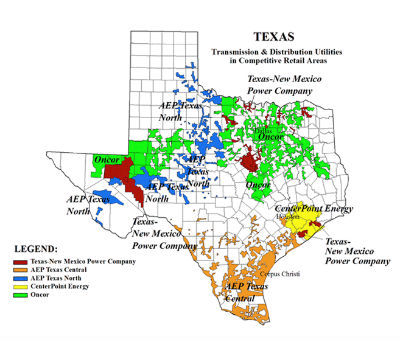Utility Companies in Texas
Included among all the players involved in the Texan energy market are different types of Transmission & Distribution Utility companies (TDUs) in Texas. Some benefit from the energy market deregulation laws, others do not. Here we give information on the different types of utility companies in Texas, the areas they service, how to contact them, and more.
Utility companies in Texas
For Texas residents, living in an area where energy is deregulated, it is crucial to understand the companies involved in producing, sending, and managing their power. The Electrical Reliability Council Of Texas (ERCOT) grid, which covers 75% of Texan territory and 85% of the electrical load in Texas, is entirely deregulated.
ERCOT works with five major Transmission & Distribution Utility companies or TUD (also known as Transmission & Distribution Service Providers or TDSP) to set up and maintain the electrical infrastructure so ERCOT can meet the power demand and maintain the flow of energy.
TDUs are specifically responsible for:
- Electricity transmission - ensuring the safe and reliable transportation of electricity along high voltage lines from the generator to the distribution system,
- Power distribution - transportation of power along low voltage lines from the distribution system to your home.
There are three types of TDU / TDSP / utility companies operating in Texas:
- Private investor owned utility companies
- Municipally owned utility companies
- Utility cooperatives
While all three types of utilities perform many of the same functions, they are not registered under the same legal entity and are not regulated by the exact same laws.
To report a power outage : Which company do I contact? If your power is out and need to know who to contact (or to check the status of an outage) find all the information needed to Report a Power Outage!
Utility companies in Texas : Investor-owned
There are five major investor-owned TDUs that have over 550 electrical power stations at their disposal to plug into the ERCOT grid. These utility companies operate in their own defined service regions and are open to retail competition.
| Utility Company (TDU) | Service Area Covered |
|---|---|
 |
Parts of west and south Texas |
 |
Houston and surrounding areas |
 |
Dallas, Fort Worth, & surrounding areas; parts of west Texas, and the previously-owned Sharyland Utilities service area |
 |
Parts of west Texas; Dallas, Fort Worth, & surrounding areas |
 |
North Texas |
The utility service area map shows the areas of Texas covered by:
- TDU Service Map
- Oncor Electric Delivery
- CenterPoint
- Texas-New Mexico Power (TNMP) and
- AEP Texas (North & Central)
Choosing a utility company in Texas
Texans can only "choose" a TDU company by where they choose to live. A TDU is determined based on the service area of the home's address. You generally won't decide where to live based on which utility company owns the region, but it can be a deciding factor when you consider cost of living.
Price differences between TDUs One thing to keep in mind is that cheaper delivery charges and energy rates does not always mean better, especially when it comes to service stability and speedy repairs. TDU tariffs are a substantial part of the total utility bill.
Price comparison between utility companies in Texas If a lower electricity bill is a top priority for your next home in Texas, refer to the chart below that shows the current TDU montlhy delivery charge and energy rates (ordered from lowest to highest ¢/kWh):
| TDU | TDU monthly base fee | TDU ¢/kWh energy rate |
|---|---|---|
| AEP North | $3.57/mo | 3.0078¢/kWh |
| Oncor Electric Delivery | $3.42/mo | 3.4928¢/kWh |
| CenterPoint | $4.39/mo | 3.2669¢/kWh |
| AEP Central | $4.27/mo | 3.7458¢/kWh |
| TNMP | $7.85/mo | 4.0403¢/kWh |
Choose an electric provider in Texas (and really choose!)
Living in a region where Oncor Electric Delivery, AEP Texas (North and Central), CenterPoint, or Texas-New Mexico Power (TNMP) is the designated utility company has its benefit: the right to choose a retail electric provider (REP). This means Texans residing in one of these five service areas have their choice of REP!
Customer Service : Which Retail Electric Providers have the best and worst records in Texas? The Public Utilities Commission of Texas manages one of the best resources to see how providers (REPs) manage and provide service to their customers. The PUC of Texas provides statistics on formal complaints filed against each REP. So, before committing to a plan that seems too good to be true, check out the PUC Customer Complaint Statistics report to see how an electricity provider fares with customers.
There are an abundance of retail electric providers to choose from in Texas. Below are the REPs with the biggest market share in the state that work with all five of the utility companies operating in the competitive electric retail regions:
| Retail Electric Provider | REP's customer login |
|---|---|
| TXU Energy* | TXU login |
| Ambit Energy | Ambit Energy login |
| Gexa Energy | Gexa Energy login |
| Reliant Energy | Reliant login |
| 4Change Energy | 4Change Energy login |
| Bulb | Bulb login |
| Direct Energy | Direct Energy login |
| Constellation Energy | Constellation Energy login |
| Cirro Energy | Cirro Energy login |
| Just Energy | Just Energy login |
*TXU - Texas Utilities Company - is not a Transmission & Distribution Utility (TDU) company (as it is commonly perceived) - TXU Energy operates as a retail electric provider (REP).
Municipal Utilities, City Utilities, and Utility Cooperatives in Texas
Customers within the service area of utility cooperatives and/or municipal utilities generally do not have a choice of electricity provider, as both the delivery and the supply of energy are organized by the utility.
Municipal Utilities and City Utilities in Texas
Municipal utilities are owned and operated by the cities they serve. They are not directly owned by the area's residents but by the resident-elected council members. Most municipal utilities (although not all) are not subject to deregulation laws, therefore consumers in these areas usually cannot choose their preferred retail energy provider (REP).
Just to give an idea of how municipal and city utilities operate and serve residents, below are a few well-known municipal utilities that Texas has to offer.
- The City of Austin Utility (CoA Utilities) electric is considered to be the progressive model for an electricity consumption rate structure, charging more ¢ per kWh to residents in the city of Austin who consume higher levels of energy. This strategy follows the rationale-based mantra of the less I use, the less I pay (even by the ¢/kWh energy rate) and promotes the practice of energy conservation.
- Brazos County, home of neighboring cities Bryan and College Station, houses both Bryan Texas Utilities (BT Utilities) and College Station Utilities. A notable difference in coverage is that College Station Utilities serves only residents living within College Station city limits while Bryan Texas Utilities serves Bryan's residents and nearly all the rest of Brazos County (beating CSU by a factor of 5, in territory coverage).
- Lubbock Power and Light (LPL) has been around since 1916 and stand strong today with over 100,000 customers in and around Lubbock making it the third largest city utility in Texas.
Utility Cooperatives
A utility cooperative is a not-for-profit company owned by its customers. Co-ops are not included in the energy deregulation laws since they are already considered to be a democratic system of power and gas supply. This system tends to exist in rural areas with low population density - in bigger cities, where population density is greater, the complexity of the system would be difficult to handle by this type of structure.
List of Municipal Utilities, City Utilities, and Utility Cooperatives in Texas
Find the contact information for your municipal utility or utility cooperative below:
- Austin Energy
- Bailey County Electric Coop, Inc.
- Bandera Electric Coop, Inc.
- Bartlett Electric Coop, Inc.
- Bastrop Electric Dept.
- Bellville Utility System
- Big Country Electric Coop
- Bluebonnet Electric Coop, Inc.
- Boerne Utilities
- Bowie-Cass Electric Coop, Inc.
- Bowie Utilities
- Brady Water, Gas & Light Works
- Brenham Municipal Utilities
- Bridgeport Light & Power System
- Brownsville Public Utilities Board
- Bryan Texas Utilities
- Burnet Utilities
- Castroville Utility System
- Central Texas Electric Coop, Inc.
- Cherokee County Electric Coop Association
- City of Hemphill
- City of Lampasas
- City of Liberty
- City of Lockhart
- City of San Marcos
- City of Whitesboro
- City Public Service Board of San Antonio
- Coleman County Electric Coop, Inc.
- Coleman Municipal Power & Light
- College Station Utilities
- Comanch Electric Coop
- Concho Valley Electric Coop, Inc.
- Cooke County Electric Coop Association
- CoServ Electric
- Cuero Electric Utility
- Deaf Smith Electric Coop, Inc.
- Deep East Texas Electric Coop, Inc.
- Denton Municipal Utilities
- Entergy
- Fannin County Electric Coop, Inc.
- Farmersville Municipal Light & Power
- Fayette Electric Coop, Inc.
- FEC Electric Coop, Inc.
- Floresville Electric Light & Power
- Fort Belknap Electric Coop, Inc.
- Garland Power & Light System
- Georgetown Water & Light Plant
- Giddings Lighting & Power System
- Granbury Municipal Electric Dept.
- Grayson Collin Electric Coop, Inc.
- Greenbelt Electric Coop, Inc.
- Greenville Electric Utility System
- Guadalupe Valley Electric Coop, Inc.
- Hamilton County Electric Coop Association
- Harmon Electric Association, Inc.
- Heart Of Texas Electric Cooperative, Inc.
- Hempstead Electric & Gas Dept.
- HILCO Electric Coop, Inc.
- Hondo Electric System
- Houston County Electric Coop, Inc.
- J-A-C Electric Coop Association
- Jackson Electric Coop, Inc.
- Jasper-Newton Electric Coop, Inc.
- Karnes Electric Coop, Inc.
- Kerrville Public Utility Board
- Kirbyville Light & Power Co.
- La Grange Utilities Dept.
- Lamar County Electric Coop Association
- Lamb County Electric Coop, Inc.
- Lea County Electric Coop, Inc.
- Lighthouse Electric Coop, Inc.
- Lubbock Power & Light
- Luling City Utilities
- Lyntegar Electric Coop, Inc.
- Magic Valley Electric Coop, Inc.
- Medina Electric Coop, Inc.
- Mid-South Electric Coop Association
- Navarro County Electric Coop, Inc.
- Navasota Valley Electric Coop, Inc.
- New Braunfels Utilities
- Newton Municipal Utilities
- North Plains Electric Coop, Inc.
- Nueces Electric Cooperative
- Panola-Harrison Electric Coop, Inc.
- Pedernales Electric Coop, Inc.
- Rio Grande Electric Coop, Inc.
- Rita Blanca Electric Coop, Inc.
- Robstown Utility System
- Rusk County Electric Coop, Inc.
- Sam Houston Electric Coop, Inc.
- San Bernard Electric Coop, Inc.
- San Patricio Electric Coop, Inc.
- Sanger Electric System
- Schulenburg Utilities Dept.
- Seguin Electric System
- Sharyland Utilities
- Smithville Utilities Dept.
- South Plains Electric Coop, Inc.
- Southwest Arkansas Electric Coop Corp.
- Southwest Rural Electric Association, Inc.
- Southwest Texas Electric Coop, Inc.
- SWEPCO
- Swisher Electric Coop, Inc.
- Taylor Electric Coop, Inc.
- Tri-County Electric Coop, Inc.
- Trinity Valley Electric Coop, Inc.
- TXU SESCO Co.
- United Electric Coop Services, Inc.
- Upshur Rural Electric Coop Corp.
- Victoria Electric Coop, Inc.
- Weatherford Municipal Utility System
- Wharton County Electric Coop, Inc.
- Wise Electric Coop, Inc.
- Wood County Electric Coop, Inc.
- Xcel Energy
- Yoakum Municipal Utilities

